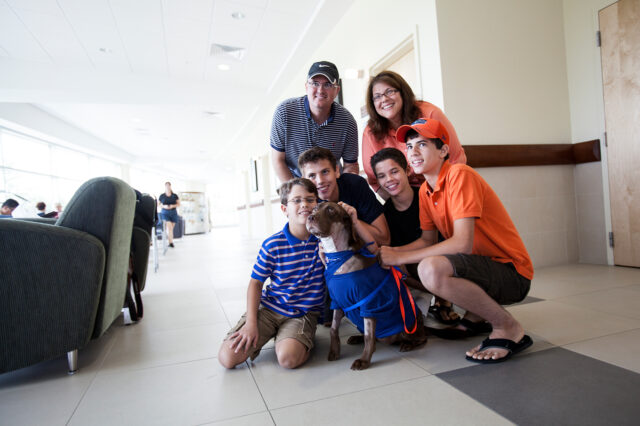Dog survives snake bite with help from UF veterinarians

Two dozen vials of antivenin — 12 times the normal dose — were needed, but in the end the life of a 3-year-old snake-bitten chocolate Labrador retriever mix was saved at the University of Florida Small Animal Hospital.
After a harrowing 14 days in the intensive care unit, the gentle brown dog, named Cali, is recuperating at home in Tavares, Fla.
“I’ve seen a lot of snake-bite victims and some pretty bad cases, but this was the worst because of all the unexpected complications that were the result of the amount of venom Cali received, and her reaction to it,” said Michael Schaer, D.V.M., an emergency and critical care specialist at the UF College of Veterinary Medicine. “Usually it takes a couple of vials of antivenin and a couple of days to turn an animal around, but in Cali’s case it was 24 vials of antivenin and two full weeks of constant care. That’s unheard of.”
Cali entered Connie and Mike Schmitts’ lives when she wandered into their yard. Although the dog seemed to have been neglected, she was obedient and housebroken. But even after the Schmitts posted a notice on a pet-finding website, no one claimed Cali, so they decided to keep her.
“We weren’t pet people, and although the kids had wanted a dog for a long time, Mike and I didn’t,” Connie Schmitt said. “But Cali changed all that. We fell in love with her.”
In early July, the Schmitts found Cali lying still in their yard with blood on her neck and foam around her mouth. Suspecting a snake bite, they took her to a local emergency clinic. But treatment with the standard two-vial dose of antivenin did not help Cali recover from the bite of what was likely an Eastern diamondback rattlesnake.
Cali was then taken to UF, where veterinarians treated her for a series of medical crises including recurrence of poisoning symptoms, heart arrhythmias, an allergic reaction to the antivenin and a bacterial infection.
The care cost thousands of dollars even long before Cali was in the clear. The Schmidts began to grapple with the thought of euthanizing their dog.
“At that point, the stress of the surmounting bill was overwhelming, but we kept thinking that we had gone so far and we couldn’t let her die now,” Schmitt said. “So, with blind faith, we continued to agree to whatever she needed, knowing that we just couldn’t give up on her and that we would find a way to come up with the money to pay for her care.”
In the end, Cali racked up close to $20,000 in hospital charges.
Schmitt worked extra hours to help cover the expenses and her sons pitched in with their summer lawn-mowing earnings. Then they turned to social media for help, creating a YouTube video, the Facebook page www.facebook.com/pleasehelpcali and an online account to which people could donate.
“The boys all got together and started pulling all the pictures they’ve taken of Cali since we got her,” Schmitt said. “We know that times are tough, and we thought that by asking people for $1 donations and asking for them to share our post, if we could spread the word far enough, we could raise enough funds to help offset the balance that we owed. We were nowhere near prepared for what happened as a result of the video.”
Contributions poured in — thousands of dollars’ worth. Enough to cover all Cali’s medical expenses, and some to spare. The family plans to donate the extra dollars to UF for the care of other animals.
Today Cali is at home, recuperating, eating, drinking and resting from her ordeal.
About the author
